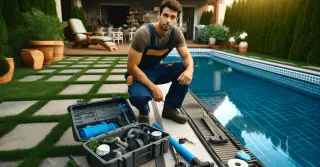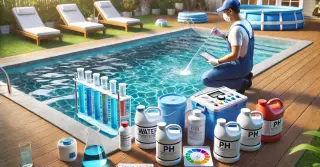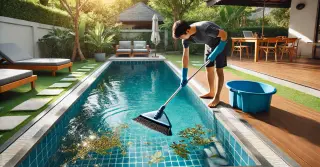Regular pool maintenance is essential for a clean, safe, and enjoyable pool. Neglecting maintenance can lead to issues like algae growth, cloudy water, and equipment malfunctions. By following a regular maintenance schedule, you can prevent these issues and keep your pool in top condition.
Essential Cleaning TasksKeeping your pool clean requires consistent cleaning efforts. These activities remove debris, prevent algae, and keep the water clear.
- Surface Skimming and Brushing: Consistent skimming removes leaves, insects, and other floating debris from the pool's surface. This prevents debris from sinking to the bottom and causing further contamination. Brushing the pool surfaces removes dirt, algae, and other buildup that can cause staining and slippery surfaces. Regular skimming and brushing keep your pool looking pristine and prevent algae growth.
- Vacuuming: Using a pool vacuum to clean the bottom removes dirt and debris from the bottom. Automatic pool vacuums can make this task easier, but manual vacuuming ensures a thorough clean. Consistent vacuuming ensures clear water and prevents debris accumulation.
Chemical BalanceKeeping the pool water balanced is vital for a safe and comfortable swimming experience. Correct chemical levels stop algae, bacteria, and contaminants, and protect the pool surfaces and equipment from damage.
- Water Testing and Adjustment: Regularly testing the pool water for chlorine, pH, alkalinity, and calcium hardness is essential. Adjust chemicals as necessary to keep the water balanced. Utilizing a quality test kit ensures accurate measurements, so you can make the right adjustments.
- Pool Shock Treatments: Shock treatments involve a high dose of chlorine being added to the pool to destroy bacteria, algae, and other harmful substances. This is especially important after heavy pool use or severe weather. Frequent shocking maintains water cleanliness and safety.
Filter MaintenanceThe pool's filtration system is crucial for clean water. Regular maintenance of the filter keeps it running efficiently.
- Cleaning Filters: Depending on your filter type—cartridge, sand, or diatomaceous earth (DE)—cleaning techniques vary. Cartridge filters should be removed and hosed down to remove dirt and debris. Sand and DE filters must be backwashed to remove trapped particles. Frequent filter cleaning maintains smooth operation and clear water.
- Changing Filter Media: Filter media will require replacement over time. Sand filters need new sand every 3-5 years. Cartridge filters should be replaced every 1-2 years. DE filter grids require replacement every 3-5 years. Regularly replacing the filter media maintains optimal filtration and water quality.
Regular pool maintenance is essential for a clean, safe, and enjoyable swimming experience. By following a structured maintenance schedule, you can ensure your pool remains in top condition for years to come.



